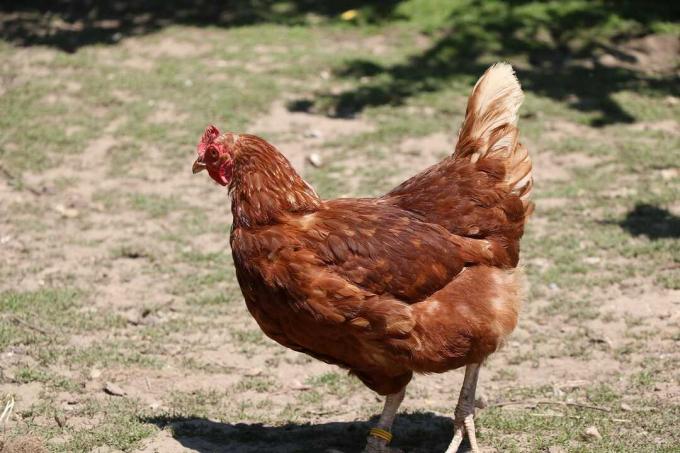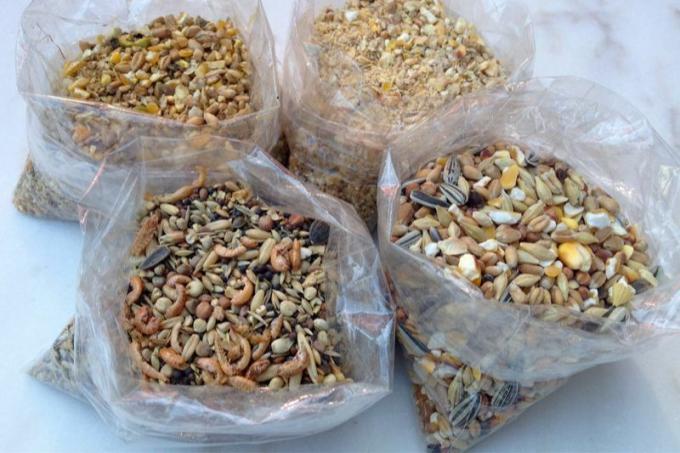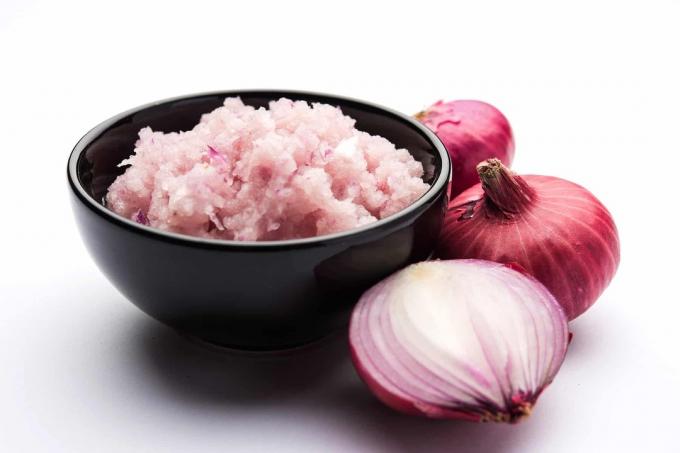

Table of contents
- Causes of heavy breathing
- cause chicken flu
- Symptoms cold
- Measures against chicken flu
- home remedies
- frequently asked Questions
If the chicken is suddenly breathing heavily, this can have various causes. As a rule, however, it is a case of chicken sniffles, which, like us humans, is an infection of the upper respiratory tract in chickens.
Causes of heavy breathing
There are various reasons why a chicken is breathing heavily, then it can also be a serious illness that should be ruled out first. Because an infection of the upper respiratory tract can also occur in connection with various other chicken diseases:
- chicken sniffles
- bird flu
- Newcastle disease
- massive infestation with worms
- infectious laryngotracheitis

But even causes that are not related to illness can make it look like the animal is breathing heavily. This includes panting due to extreme heat, because like dogs, chickens pant when they are hot because they don't have sweat glands.
Tip:
If a chicken is panting, it is advisable to move it to a cool place and provide enough water. Chickens open their beaks to cool off, this may be seen as heavy breathing.
cause chicken flu
Just like us humans, chickens can also contract an infection of the upper respiratory tract. However, chicken sniffles can have various causes:
- Adenoviruses and rhinoviruses have invaded the mucous membranes
- humid and windy weather
- Chicken coop is not draught-free
- Viruses spread better in damp conditions

If the heavy breathing is therefore recognized in bad weather conditions, it is usually chicken sniffles. This can then be treated well.
Symptoms cold
Chicken runny nose is not always easy to spot. Because the chickens show a variety of symptoms. However, heavy breathing is a first clue as the chicken is having trouble breathing due to nasal congestion. There are other symptoms that can occur in connection with which chicken cold can be recognized:
- nasal discharge
- Sneeze
- teary eyes
- audible breath noise, often rattling
- may sound like dangerous-sounding breath sounds
- Beak is opened wide
- intermittent gagging
- frequent shaking of the head
A notice:
Always consult a veterinarian for advice if you are unsure about diagnosing the symptoms. This also applies if the chicken does not feel better after several days.
Measures against chicken flu
If you have ruled out other diseases and it is a virus that caused the chicken sniffles, then you must take further measures immediately. First of all, it is important that you separate the sick chicken from the others so that the virus does not spread further. After that, further measures are to be taken:
- Thoroughly muck out the entire barn
- disinfect
- sprinkle thickly
- add special vitamins for chickens from specialist shops to the drinking water
- do not let sick chicken out in muddy, wet and cold weather
- Heat lamp for sick chicken
- further avoid possible draughts
- high-quality lining to strengthen the immune system

If the general condition of the chicken is strengthened, then the chicken organism can cope quite well with the pathogens and the chicken will quickly recover. Also with fowl mites The chickens can cope better with a balanced diet, but this infestation should also be dealt with quickly.
A notice:
If one chicken is sick, there is unfortunately a high probability that the other chickens have already been infected. It is therefore particularly important and recommended to observe the animals over the next few days. The incubation period is between a few hours and several days.
home remedies
In contrast to the use of various chemically manufactured medical products, there are tried-and-tested household remedies that have already proven their worth for chicken sniffles:
- Feeding with respiratory herbs
- inhalation
- Chamomile decoction is suitable for this
- set up a hot bowl in a small room
- Put chicken in the room
- Remove the bowl after an hour
- Application of essential oils
- feed grated onions
- Enrich drinking water with multivitamin mixture

Tip:
When using essential oils for inhalation, Japanese medicinal oil is useful. Two drops of this are placed in a bowl of hot water, which is also placed in the same small room where the sick chicken is kept for an hour.
frequently asked Questions
No, unfortunately that is not the case. Because some animals hardly show any symptoms and actually behave normally. However, a chicken that is actually behaving normally makes “strange” noises from time to time, such as a brief squeak while eating, then this can also be chicken sniffles act.
Chickens need vitamins to strengthen their immune system. It is therefore helpful to administer these vitamins directly with the drinking water. The barn should also be checked for drafts. In bad weather, i.e. damp and cold weather, the chickens can also remain in the warm barn.
Antibiotics should be avoided in this case, because if the cold trigger is a virus, then the use of antibiotics that are only used against bacteria will not work. Such an administration should therefore take place after consultation with the veterinarian, who may suspect bacterial colonization on the already damaged mucous membrane.
If the chicken has a cold, it is advisable to offer another feed for three days. For this purpose, garlic, grated carrots, grated coconut and yeast flakes are mixed with a little olive oil. The normal chicken feed is reduced during this time so that part of the feed requirement is covered by the mixture. After about two days, the chicken should feel relief.
If it is not a simple cold caused by viruses and bad weather, but the dreaded bird flu, then this is easy to find out. Because the chickens suffering from the flu show strong symptoms. The plumage is dull, the hens suffer from weakness mostly due to high fever. In addition, edema forms on various parts of the body, such as the head, legs or neck. There is also diarrhea and possible blue discoloration of the skin.
 Maike
Maike
Learn more about pets

Common chicken diseases with symptoms + pictures
Chickens are low-maintenance animals, but they are not immune to diseases. Parasites, viruses or bacteria can cause them problems and serious illnesses are even notifiable. Here you will find the most common chicken diseases with symptoms and pictures at a glance.

Chicken twists its head: what does that mean?
When chickens suddenly tilt their heads, there is usually a serious reason behind it. Here you can find out what can be responsible and what action should be taken if a chicken turns its head.

Chicken tilts to the side: balance disorder?
Keeping chickens in your own garden is becoming increasingly popular. All you need is enough exercise and a winter-proof stable. Unfortunately, chickens are not the most robust creatures. For example, if a chicken repeatedly falls to the side, it can be due to an imbalance, but it can also be worse.

Bird Names: 348 Popular Budgie Names
If you have budgies as pets or are planning to get two parakeets, the exciting task ahead of you is naming them appropriately. In this text you will be presented with various budgie names to help you choose of a name that suits both your feathered friend and your personal taste fits.

441 guinea pig names from cute to funny
A suitable guinea pig name can not only be a fun or cute addition, but also a way to create a special bond with your little furry friend.

Turtle Names: 473 Names for Turtles
Finding an appropriate name for your turtle can be a fun and meaningful task. A well-chosen turtle name can underline your friend's personality and uniqueness and create a special bond between the two of you. Whether you're looking for male, female, or gender-neutral names, you'll find a wide range of names for your […]



